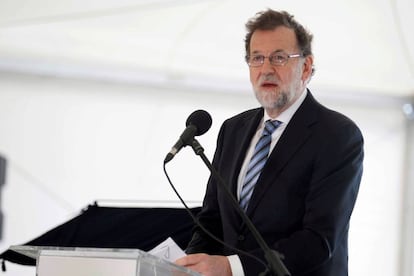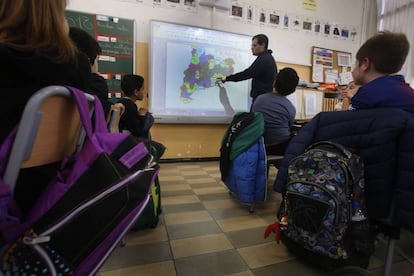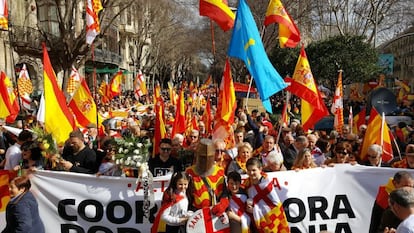Madrid prepares for prolonged control over gridlocked Catalonia
Central authorities had been hoping that a new regional government would in place by now

Catalonia’s self-rule should have been restored this month, according to the central government’s original calculations. Following the early regional elections of December 21, a new Catalan government should have been up and running by now, putting an end to the emergency measures invoked under Article 155 of the Constitution in response to the unilateral independence declaration made in late October by previous Catalan officials.
But more than two months after Catalans went to the polls, there is still no new government in sight. Separatist parties, which secured a collective majority, have failed to produce a viable candidate to lead the region, instead proposing nominees who are under court investigation for rebellion, secession and misuse of public funds over the failed breakaway bid.
The priority is for a government to be formed in Catalonia, not to open up debates that might block it
Ander Gil, Socialist senator
If no working candidate is found, Catalonia could be faced with a fresh election. And in the meantime, Spain’s central government will be stuck with the job of running day-to-day affairs in the region.
Under the rules of Article 155, which went into effect on October 27, central government officials have the obligation to appear before the Spanish Senate every two months to provide a situation report. The state secretary for territorial administration, Roberto Bermúdez de Castro, offered a report on December 4, and Deputy Prime Minister Soraya Sáenz de Santamaría appeared before the upper house on December 17, four days before the regional election.
Madrid expected that the following appearance would simply confirm the end of the emergency takeover. Instead, government sources admit that the message will instead probably be that Article 155 remains in place. For the last two weeks, La Moncloa – the seat of government – has been shuffling dates for a new Senate appearance, even as opposition parties note that more than two months have already elapsed since the last report.

“There’s no problem with appearing and explaining what’s being done, on the contrary,” said a government source, denying that Madrid is dragging its feet on the issue.
The wait is due to the fact that the Rajoy administration was expecting Catalan separatist parties to finally produce “a real” candidate next week, after first backing ousted leader Carles Puigdemont, who is is self-imposed exile in Belgium and cannot be remotely appointed, and then supporting Jordi Sànchez, a civic leader who is in pre-trial detention in connection with the rebellion probe, and might not be granted prison leave to attend the investiture debate in the Catalan parliament.
But now that the anti-capitalist CUP, a small but necessary partner in the separatist bloc, is refusing to back Sànchez, it is unclear what pro-independence leaders will do next. Catalan parliament speaker Roger Torrent is scheduled to meet with party chiefs this week to craft an agreement as to who the official nominee should be, but the CUP is refusing to back Sànchez or any other candidate who represents “submission to Spanish laws.” Marta Pascal, president of PDeCAT (the main partner in the Together for Catalonia group headed by Carles Puigdemont), replied that “we are not in the period of disobedience and unilateral action.”
Government sources told EL PAÍS that the Senate session will take place sometime in March. The opposition parties Unidos Podemos, Ciudadanos and PDeCAT want Deputy Premier Soraya Sáenz de Santamaría, who is the highest central official in charge of Catalan affairs, to provide details about the government’s actions, including its apparent plans to tweak education policies in Catalonia to ensure that the Spanish language is taught inside public schools in the proportion set by several court rulings.
The Socialist Party (PSOE) is the only opposition group that is not pressuring the government into discussing its actions in Catalonia. The Socialist spokesman in the upper house, Ander Gil, said that for now, “this is not the priority. The priority is for a government to be formed in Catalonia, not to open up debates that might block it.”
Marching for Tabarnia

Pro-unity Catalans marched on Sunday in Barcelona under the flag of Tabarnia, a make-believe state whose name is a combination of Tarragona and Barcelona – two Catalan provinces where unionist sentiment is stronger, and which would hypothetically vote to break away from an independent Catalonia if the latter ever seceded from Spain. The demonstration was organized by Plataforma por Tabarnia, a group that banks on humor to counter separatist claims, and to educate the public about voting legislation. Attendance figures for the Sunday march varied considerably, with local police putting it at 15,000 people and organizers talking about 200,000 marchers.
English version by Susana Urra.
Tu suscripción se está usando en otro dispositivo
¿Quieres añadir otro usuario a tu suscripción?
Si continúas leyendo en este dispositivo, no se podrá leer en el otro.
FlechaTu suscripción se está usando en otro dispositivo y solo puedes acceder a EL PAÍS desde un dispositivo a la vez.
Si quieres compartir tu cuenta, cambia tu suscripción a la modalidad Premium, así podrás añadir otro usuario. Cada uno accederá con su propia cuenta de email, lo que os permitirá personalizar vuestra experiencia en EL PAÍS.
¿Tienes una suscripción de empresa? Accede aquí para contratar más cuentas.
En el caso de no saber quién está usando tu cuenta, te recomendamos cambiar tu contraseña aquí.
Si decides continuar compartiendo tu cuenta, este mensaje se mostrará en tu dispositivo y en el de la otra persona que está usando tu cuenta de forma indefinida, afectando a tu experiencia de lectura. Puedes consultar aquí los términos y condiciones de la suscripción digital.








































